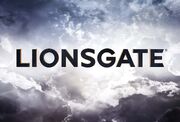
The Lions Gate Entertainment logo, usually seen at the beginning of their movies.

The Lions Gate Entertainment logo.
Information[]
Lionsgate Entertainment Corporation is a Canadian-American entertainment company. The company was formed in Vancouver, British Columbia, on July 3, 1997, and is headquartered in Santa Monica, California. As of November 2013, it is the most commercially successful mini major film and television distribution company in North America and the seventh most profitable movie studio. Lionsgate Films is not to be confused with Robert Altman's former company, Lion's Gate Films, although both names refer to the same Vancouver landmark, the Lions Gate bridge.
History[]
Lionsgate Entertainment Corporation (Lionsgate) was formed in 1997 by Frank Giustra and Avi Federgreen with a $16 million investment including another $40 million from other investors which included Keyur Patel and Yorkton Securities' executives such as G. Scott Paterson. Giustra had recently retired as CEO from Yorkton, an investment bank, and Paterson was then President. Giustra then merged Lionsgate with Toronto Stock Exchange listed Beringer Gold Corp. (founded in 1986) to take the company public. Beringer's mining assets were soon sold off.
Lionsgate then began a series of acquisitions to get into the film industry. The company bought a number of small production facilities and distributors, starting with Montreal-based Cinépix Film Properties (renamed as Lions Gate Films) and North Shore Studios (renamed Lions Gate Studios) in Vancouver, British Columbia. Mandalay Television was acquired by Lionsgate from Peter Guber for a 4% Lionsgate stake. In 1998, Lionsgate helped Guber form Mandalay Pictures with a 45% investment in Mandalay. Lionsgate followed that up with a June purchase of International Movie Group, Inc. , a bankrupt film distributor previously invested in by Guber and Yorktown Securities, for its film library. IMG's CEO Peter Strauss became president of Lions Gate Entertainment, Inc. (LGE), its U.S. holding company. Lions Gate Media subsidiary was also formed to produce for television.
Completing its first year of operation, Lionsgate had revenue of $42.2 million with loss of $397,000. The company share price dropped to a low of $1.40. This limited the corporation's ability to make acquisitions via stock swaps. Lions Gate instead made its next acquisition of Termite Art Productions, a reality-based television production company, for $2.75 million by issuing three convertible promissory notes. Giustra had the shareholders vote to move the company's public listing from the Toronto Stock Exchange to the American Stock Exchange, along with a two-for-one stock consolidation to qualify, for greater exposure that might boost share value.
In January 1999, Roman Doroniuk was named president and chief operating officers of Lionsgate, which led to the corporation's financial operations being moved in April to Doroniuk's offices in Toronto while corporate headquarters remained in Vancouver. Lionsgate created US based Avalanche Films and acquired half of Sterling Home Entertainment, both in video sales. Again, Lionsgate registered losses in its second year of $9.3 million on revenues of $78.3 million with most of the losses were from its stake in Mandalay Pictures. Thus in the summer, Lionsgate placed its studios up for sale with no buyers. TV operations were changed to non-network hour-long series over riskier network shows and ended its relationship with Mandalay Television. The corporation sought out more capital and cash with a filing of a preliminary prospectus for the sale of preferred stock and common stock warrants and a $13.4 million line of credit.
Credits[]
- The text is copied from its Wikipedia article under WP:COPYRIGHT.
Trivia[]
- Lions Gate Entertainment came up with the idea for the Alpha and Omega movie. Later on, they decided to make it a series.
